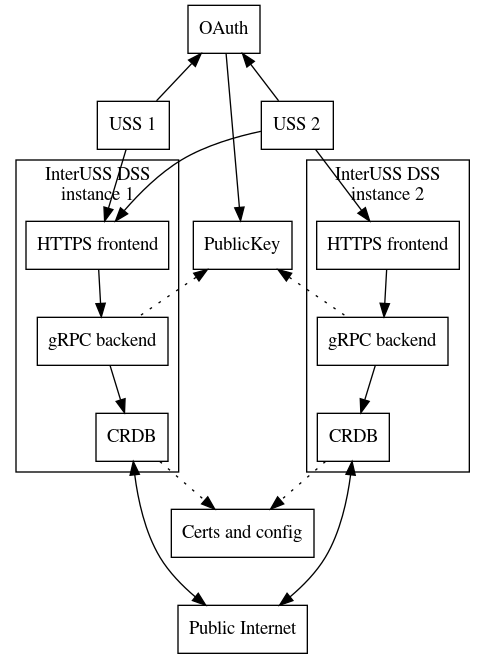This repository contains a simple and open service used by separate UAS Service Suppliers (USSs), often in different organizations, to communicate information about UAS operations and coordinate with each other. This service is a Discovery and Synchronization Service (DSS) as described in the ASTM remote ID standard. This flexible and distributed system is used to connect multiple USSs operating in the same general area to share information while protecting operator and consumer privacy. The system is focused on facilitating communication amongst actively operating USSs without details about UAS operations stored or processed in the DSS.
Conceptual background on the DSS and services it supports may be found here.
A "DSS Region" consists of one or more DSS instances sharing the same DSS Airspace Representation (DAR) by forming a single CockroachDB cluster. In the simplified diagram above, two DSS instances share the same DAR via CRDB certificates and configuration which means the two HTTPS frontends may be used interchangeably. USS 1 chooses to use only instance 1 while USS 2 uses both instances for improved resilience to failures.
Serves as an HTTPS gateway to the business logic, translating between HTTPS request and gRPC to allow users to communicate to the DSS via simple HTTPS calls. This code is currently generated via grpc-gateway, and does not do much other than translation. See the API specification here.
Component responsible for all the business logic as well as authentication. This backend talks directly to CockroachDB.
Individual CockroachDB nodes hosting sharded data of the DAR. More information about CockroachDB here.
Component responsible for performing orderly database schema migrations, including database bootstrapping. Invoked automatically on first run along with the CRDB cluster-init job, or when requested manually by a user.
build/has all of the configuration required to build and deploy a DSS instance. The README in that directory contains more information.pkg/contains all of the source code for the DSS. See the README in that directory for more information.cmds/contains entry points and docker files for the actual binaries (thehttp-gatewayandgrpc-backend)test/contains some tests; see the README for more information about testing.
If you are new to the project, read this document to get a long form introduction about repository structure
- The current implementation relies on CockroachDB for data storage and synchronization between DSS participants. See implementation details for more information.
